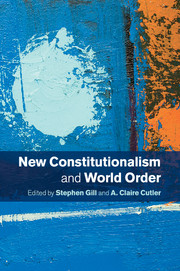Book contents
- Frontmatter
- Contents
- List of Figures
- List of Contributors
- Acknowledgements
- List of Acronyms
- 1 New constitutionalism and world order
- Part I Concepts
- Part II Genealogy, origins and world order
- 5 Toward a genealogy of the new constitutionalism
- 6 The origins of the new constitutionalism
- Part III Multilevel governance and neo-liberalization
- Part IV Trade, investment and taxation
- Part V Social reproduction, welfare and ecology
- Part VI Globalization from below and prospects for a just new constitutionalism
- Glossary
- Appendix
- Bibliography
- Index
5 - Toward a genealogy of the new constitutionalism
The empire of liberty and domination
from Part II - Genealogy, origins and world order
Published online by Cambridge University Press: 05 February 2014
- Frontmatter
- Contents
- List of Figures
- List of Contributors
- Acknowledgements
- List of Acronyms
- 1 New constitutionalism and world order
- Part I Concepts
- Part II Genealogy, origins and world order
- 5 Toward a genealogy of the new constitutionalism
- 6 The origins of the new constitutionalism
- Part III Multilevel governance and neo-liberalization
- Part IV Trade, investment and taxation
- Part V Social reproduction, welfare and ecology
- Part VI Globalization from below and prospects for a just new constitutionalism
- Glossary
- Appendix
- Bibliography
- Index
Summary
Despite being the very legal and political framework of social order and the modern state, international relations and (international) political economy theorists have spent precious little time discussing constitutions or constitutionalism. Mainstream theorists, focused as they are at the level of the international, spend even less time considering the genealogy of these foundational politico-legal frameworks. In the discipline of political science, constitutionalism appears to be the purview of political theorists who largely approach the question of constitutionalism from ahistorical perspectives that rely on some variant of social contract theory and rational actors (Brennan and Buchanan 1985; Hayek 1960; Rawls 1971). In much of this literature, liberal constitutionalism is considered to be the most desirable form of government in so far as it is claimed that such frameworks enable material progress and human freedom by circumscribing governmental power.
However, beginning in the 1990s a new literature in IR and international law began to address an emerging juridico-political trend Gill called the ‘new constitutionalism’ (1992a). Far from employing the language of hypothetical social contract theory, these theorists offered a more critical and historically informed assessment of the new liberal constitutions being written and the trade and investment agreements that served to extend a previously circumscribed liberal world economic order. These critical scholars began to question the nature and purpose of these new legal frameworks from the point of view of class, power and global inequality at the very time when new constitutional developments were widely taken as a sign of liberal democratic capitalism’s triumph over all other forms of political and economic rule.
- Type
- Chapter
- Information
- New Constitutionalism and World Order , pp. 81 - 94Publisher: Cambridge University PressPrint publication year: 2014
- 2
- Cited by



